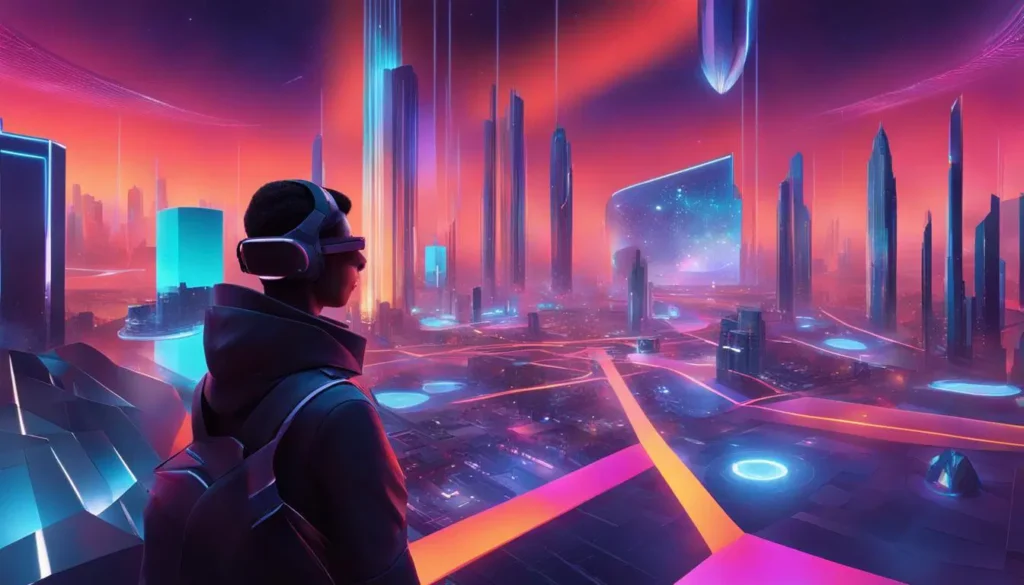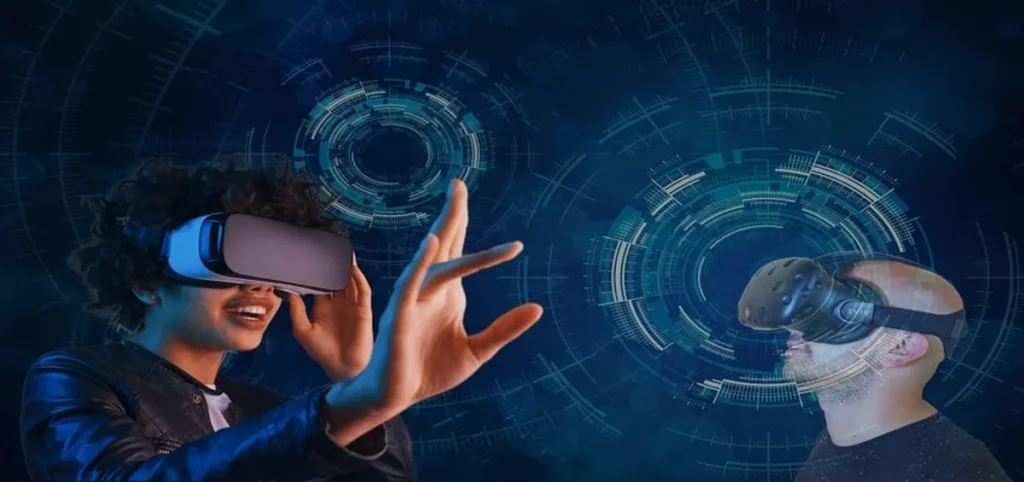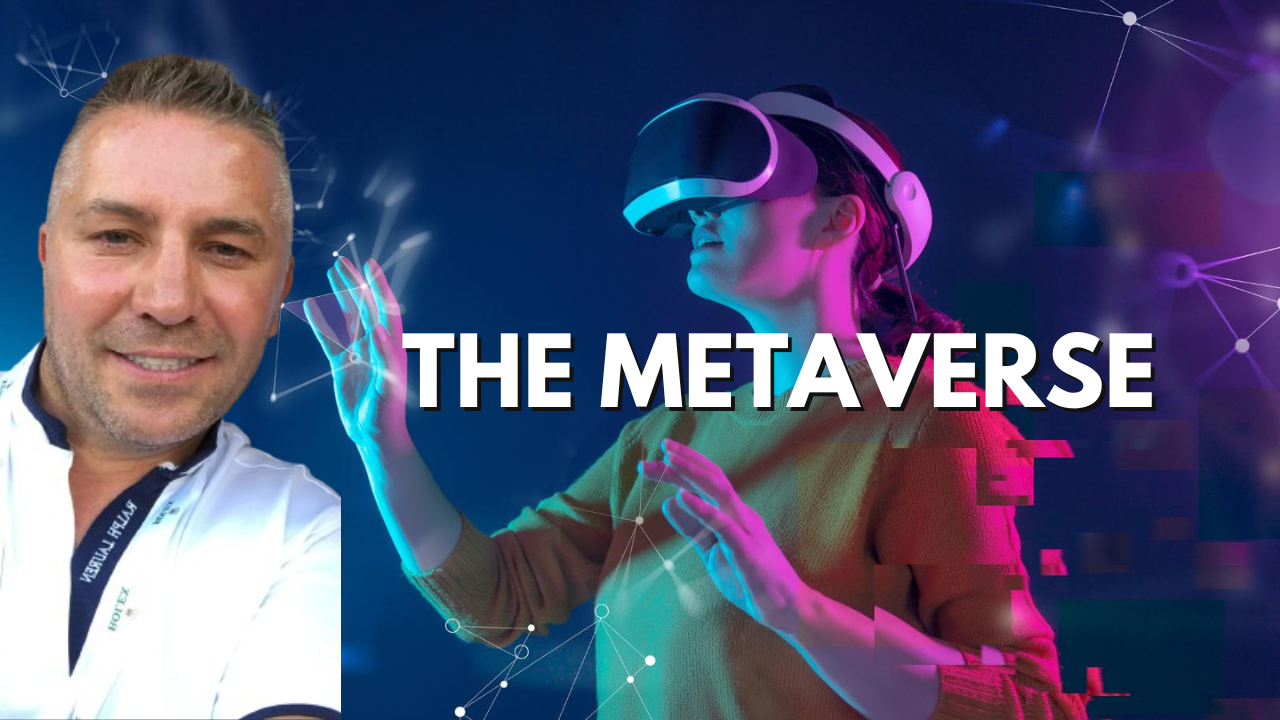In recent years, the concept of the metaverse has captured the imagination of technologists, futurists, and enthusiasts alike. Defined as a collective virtual shared space, created by the convergence of virtually enhanced physical reality and physically persistent virtual space, the metaverse represents a new frontier for digital interaction, entertainment, and commerce. In this blog post, we’ll explore the concept of the metaverse, examine its potential impact on various industries, and discuss the opportunities and challenges it presents in shaping the future of human experience.
Understanding the Metaverse:

- What is the Metaverse? The term “metaverse” was coined by science fiction author Neal Stephenson in his 1992 novel “Snow Crash,” where it referred to a virtual reality-based successor to the internet. Today, the metaverse encompasses a broad range of virtual worlds, online games, social platforms, and immersive experiences that blur the line between physical and digital reality. It represents a persistent, interconnected digital universe where users can interact, create, and transact in real-time across different platforms and devices.
- Key Components of the Metaverse: The metaverse is characterized by several key components that enable immersive and interactive experiences:
- Virtual Worlds: These are digital environments that simulate physical reality and enable users to explore, interact, and collaborate with others in real-time. Examples include virtual reality (VR) environments, massively multiplayer online games (MMOs), and social virtual worlds like Second Life and Decentraland.
- Avatar-based Interaction: Users in the metaverse typically interact with each other through digital representations known as avatars, which can be customized to reflect their identities, preferences, and personalities. Avatars allow users to express themselves, socialize with others, and participate in virtual activities and events.
- Decentralized Platforms: The metaverse is increasingly being built on decentralized platforms and protocols, leveraging blockchain technology to enable secure, transparent, and interoperable interactions. Decentralized finance (DeFi), non-fungible tokens (NFTs), and blockchain-based virtual economies are integral parts of the metaverse ecosystem.
- Immersive Technologies: Immersive technologies such as virtual reality (VR), augmented reality (AR), and mixed reality (MR) play a crucial role in creating immersive and interactive experiences within the metaverse. These technologies enable users to engage with digital content and environments in more intuitive and immersive ways, blurring the boundaries between physical and virtual reality.
Impact of the Metaverse:

- Transforming Entertainment and Media: The metaverse has the potential to revolutionize the entertainment and media industries by offering new forms of interactive storytelling, gaming, and content creation. Virtual reality experiences, live-streamed events, and interactive narratives allow users to engage with content in unprecedented ways, leading to more immersive and personalized entertainment experiences.
- Redefining Social Interaction and Collaboration: In the metaverse, social interaction and collaboration take on new dimensions as users interact with each other in virtual spaces and communities. Virtual meetings, conferences, and gatherings enable remote teams and communities to connect and collaborate in real-time, transcending geographical boundaries and time zones. Social virtual worlds and multiplayer games provide platforms for socializing, networking, and building relationships in digital environments.
- Creating New Economic Opportunities: The metaverse has the potential to create new economic opportunities and revenue streams through virtual commerce, digital assets, and decentralized economies. Virtual goods, virtual real estate, and digital collectibles are bought, sold, and traded within virtual worlds and platforms, creating new markets and monetization models for creators, developers, and entrepreneurs. Decentralized finance (DeFi) platforms and blockchain-based virtual economies enable users to participate in financial activities and transactions within the metaverse, unlocking new avenues for investment, fundraising, and wealth creation.
Opportunities and Challenges:
- Opportunities:
- Creative Expression: The metaverse offers creators and artists a platform for unlimited creative expression and experimentation, allowing them to showcase their talents and reach global audiences.
- Economic Empowerment: Decentralized platforms and virtual economies empower individuals to monetize their skills, talents, and digital assets, creating new opportunities for economic empowerment and financial inclusion.
- Social Connectivity: The metaverse fosters social connectivity and community building, enabling users to form meaningful relationships, collaborate on projects, and share experiences across geographical and cultural boundaries.
- Challenges:
- Technical Complexity: Building and navigating the metaverse involves complex technical challenges, including scalability, interoperability, and user experience design. Overcoming these challenges requires collaboration among stakeholders and continuous innovation in technology and infrastructure.
- Privacy and Security: The metaverse raises concerns about privacy, data security, and digital identity management, as users engage in virtual interactions and transactions across multiple platforms and devices. Ensuring robust privacy protections and security measures is essential to safeguarding users’ rights and interests.
- Digital Divide: The metaverse risks exacerbating existing inequalities and disparities in access to technology, resources, and opportunities. Bridging the digital divide and ensuring equitable access to the metaverse for all individuals and communities is a critical challenge that requires concerted efforts from policymakers, industry stakeholders, and civil society organizations.
Conclusion: The metaverse represents a transformative vision of the future, where physical and digital realities converge to create immersive, interactive, and interconnected experiences. From entertainment and media to social interaction and commerce, the metaverse has the potential to reshape the way we live, work, and play in the digital age. While it presents exciting opportunities for innovation, creativity, and economic empowerment, the metaverse also poses challenges in terms of technical complexity, privacy, security, and inclusivity. As we continue to explore and navigate the possibilities of the metaverse, it will be essential to address these challenges while harnessing its transformative potential to create a more connected, collaborative, and inclusive digital future.

